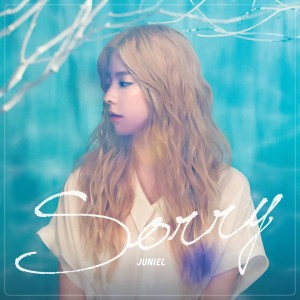 FNC Entertainment’s prized and poised singer-songwriter Juniel returned to the K-pop scene through an official Music Bank appearance on August 21st with her comeback single “Sorry” after the conclusion of her “Spring Love” collaboration with Teen Top’s Niel in April. Prior to her collaboration, Juniel had effortlessly delighted with her endearing and feminine-themed songs “I think I’m in Love” and “Pretty Boy” over the past two years, but it is her debut song; the melancholic memoir “Illa Illa” in 2012 that ultimately defines for me her capacity and habitat as a solo artist (and not forgetting the magnanimity of her “flower child” reprisal “Bad Man” either).
FNC Entertainment’s prized and poised singer-songwriter Juniel returned to the K-pop scene through an official Music Bank appearance on August 21st with her comeback single “Sorry” after the conclusion of her “Spring Love” collaboration with Teen Top’s Niel in April. Prior to her collaboration, Juniel had effortlessly delighted with her endearing and feminine-themed songs “I think I’m in Love” and “Pretty Boy” over the past two years, but it is her debut song; the melancholic memoir “Illa Illa” in 2012 that ultimately defines for me her capacity and habitat as a solo artist (and not forgetting the magnanimity of her “flower child” reprisal “Bad Man” either).
Through the release of “Sorry”, one realises that Juniel has come to favour the muskiness of a mature love over the promotion of a reverie-like romance almost always associated with youth and girlish fancies. After quite some time, “Sorry” is a pleasing song from Juniel that through a classic allusion powdered in subtlety shows us the agony of a hopeless love that must eventually dissolve into a vast continuity, perhaps like the ocean itself.
[youtube http://www.youtube.com/watch?v=lz1Q6DJ4gIg]Juniel’s miniature aquarium in “Sorry” is a world of its own, with indefinite boundaries embodied by her lounging sorrowfully in a bathtub as she is surrounded by her Blue Tang and Clown Fish companions, caressing bouquets of drowned flowers and letting the rapture of a running tap comfort her in her depression. The overarching theme, in case you haven’t caught on, is inspired by the beloved Little Mermaid story whose quintessence is the limitations of a love not meant to be. In this sense Juniel takes a more subjective approach to the physical restrictions the Little Mermaid had (having no legs) in her present, while looking back to the memories she made with the one she loved when she could walk the earth in the past. Juniel is confined to a brass-footed bathtub (or ocean so to speak) because it is her reality, yet the sentient romance was a trade that allowed her to live at the cost of haunting her with its impossibility.
The futility of the relationship in this way, is demarcated by her hatred for the word ‘sorry’. Although she knows it, ‘sorry’ is a topical term that only hides her greatest fear, which is her loved one getting sick of her and leaving her. Meanwhile, she cannot let go because the remnants of her love, the memories, are what she cannot be alone with. The lyrics of “Sorry” are penned to a degree of awe and, with their simplicity, carry more complexity and possible endings than intended.
Your ‘sorry’ hurts
Don’t say that
I don’t like your ‘sorry’
Because it feels like the last time
Because I still love you
Because it’s not over for me
The ‘because it feels like the last time’ verse indicates that Juniel had gone through an anguish similar to this in the past, but in fact is a reference to the relatable and realistic meaning the song intends to deliver. In her aquatic area, Juniel is the Little Mermaid and her relationship with her loved one (who is portrayed by the handsome leader of FT Island, Choi Jong-hoon) ends because it cannot be, while in her memories of smiling and frolicking with him she hopes for it to last forever and that it never leaves her heartbroken. In this light, the lyrics fuse together elements of fantasy and breaking up with elements of reality and hope for the relationship to never end. Through the lyrics, two contrarieties match up and ingeniously deliver an ultimate message.
Musically, “Sorry” starts off with a soft acoustic guitar melody and ephemeral piano strokes, retaining its fluidity until Juniel’s vocals deliver the introduction clearly and in the crystalline. The originality of the MV is guided by the camera flashing to Juniel seated on a wooden stool, her famed guitar in her embrace. The culmination of the chorus leads us to a solid falsetto and grainy yet smooth harmonization from Juniel, and the anchor sits on her rhythmic declaration of ‘I still love you’ and ‘It’s not the end for me’, the two most mellifluous verses of the entire song. In the final scene, the bridge sifts the conventional and unchanging melody of the song prior and delves into an extremely clean buildup – the zenith of Juniel’s vocals and her conclusive nevertheless grudgingly aloof realization – ‘your last words, was it sorry?’
“Sorry” is by far Juniel’s best attempt since her brilliant “Illa Illa” and “Bad Man” days but is not completely flawless. In the case of the chorus and the generic nature of the lyrics, the song does lose some of the originality it could have upheld due to Juniel’s reputation as a unique artist, but the inspiration “Sorry” drew from the classic Little Mermaid story and its reworking of it into an experience both fantastical and realistic makes up for some of its shortcomings – allowing for a subjective sojourn into the melancholia of love and showing us a style of Juniel we prefer and admire.
Rating: 3/5





